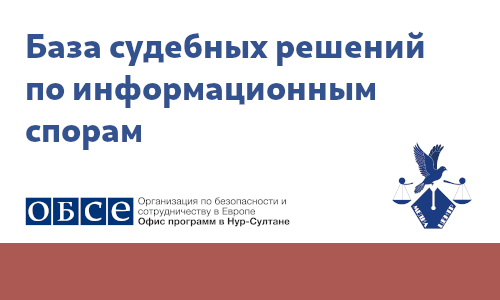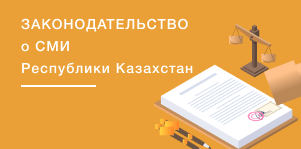3 мая, 2024 - 16:35
FREE PRESS - FREE COUNTRY
929


FREE PRESS - FREE COUNTRY
On the World Press Freedom Day, the Legal Media Center expresses serious concern about the current situation in Kazakhstan's media sphere. We call on all interested parties to pay attention to the increasing cases of harassment of journalists, as well as the draft law on mass media, which contains very few progressive norms.
Despite the President's stated policy of protecting freedom of speech and supporting the media, since the beginning of the year, trials against journalists initiated by representatives of government agencies and law enforcement structures have not ceased. At the same time, they have signs of deliberate and prolonged persecution.
Here are some illustrative examples. Last year, the Shymkent police chief accused journalist Marina Nizovkina of libel. The first court acquitted her, but the second instance found her guilty and imposed a fine of 180 MRP (620,000 tenge). Recently, Nizovkina has again been subjected to an administrative protocol for libel. We see signs of deliberate strategic harassment to intimidate the journalist or paralyze her activities.
The Ministry of Information and Culture initiated a libel lawsuit against journalist Askhat Niyazov. "The "offense" that Niyazov committed was a repost of Pro Tenge's publication in support of Radio Azattyk's denial of accreditation. The case was recently dismissed for lack of corpus delicti in his actions. Nevertheless, this practice is alarming and raises doubts about the professionalism of the employees of the Ministry of Information who initiate such cases.
The trial over the denial of accreditation of Radio Azattyk journalists by the Ministry of Foreign Affairs lasted several months. The foreign media fought for their legal right to receive and disseminate information, and eventually the parties came to an amicable agreement. Nevertheless, we believe that with the adoption of the new law on mass media, the threat of abuse of the accreditation denial procedure may seriously affect the situation with freedom of speech in Kazakhstan.
Journalist Daniyar Adilbekov, who was accused of "knowingly false denunciation", later changed the article to "dissemination of false information", and now the original charge has been returned. Despite the serious charge, the journalist does not pose a threat to society. Therefore, we believe that keeping him in the TDF is an excessive and disproportionate measure, unacceptable in a democratic society and likely to increase fear among journalists.
The trial of journalist Duman Mukhametkarim continues. He is accused of financing extremism and participation in a banned organization. The trial is being held in a closed format, which raises many questions and makes it impossible to get a picture of what is happening.
In April, Jamila Maricheva, founder of the protenge channel, was stopped by police while jogging and taken to the Bostandyk district administration. Authorities explained that the reason was the publication of ProTenge in support of the Azattyk edition. Maricheva is accused of spreading false information. The post became the subject of a pre-trial investigation, and the case was transferred to the administrative court.
Since the end of last year, a number of Kazakhstani online media outlets have been subjected to cyberattacks. Among them are Kursiv.Media, ProTenge, Inbusiness.kz, KazTAG, Nege.kz, Lsm.kz, and the Telegram channel Shishkin_like. According to media employees, the attacks are political in nature and violate the right to access to information.
All these cases point to the desire of the state authorities to silence journalists, hinder their professional activities and deprive the public of receiving important and objective information. In their publications journalists raised the issues of corruption of civil servants, unscrupulous performance of official duties, which can be regarded only as criticism. But the state authorities, using administrative resources, are looking for violations of laws. And we regard this as an illegal deprivation of their right to freedom of speech and information.
It is also necessary to note the bill on mass media, which is currently under consideration in the Senate. Apart from a couple of progressive norms on the statute of limitations and the exclusion of press cards, the document does not contain any fundamentally new points. It is a supervisory-regulatory law designed to monitor the media, but in no way responsible for their safety, protect their professional rights and ensure the protection of freedom of speech. Unfortunately, the text of the draft law does not comply with international standards on freedom of speech and is aimed at strengthening censorship.
We recall that Kazakhstan has signed a number of important international documents aimed at developing freedom of speech and protecting human rights, and has joined the OSCE, the United Nations and other organizations. This means that we have voluntarily decided to implement democratic reforms and support them in every possible way. But in practice we see a steady movement backwards, with detentions of journalists, lawsuits and other attributes of an authoritarian state. This is a violation of Kazakhstan's international obligations.
In conclusion, we note that in the "Reporters Without Borders" rating Kazakhstan has worsened its position over the past year, moving from 134 to 142nd place out of 180, and in the "Press Freedom Index" it was rated as an "unfree country".
Based on the above, we call on:
- Kazakhstan's authorities to stop persecuting journalists and democratize the draft law on mass media,
- the journalistic community to unite to protect and defend their professional rights,
- civil society to support efforts to protect the media in order to prevent repression and backsliding in the protection of freedom of expression and information.





